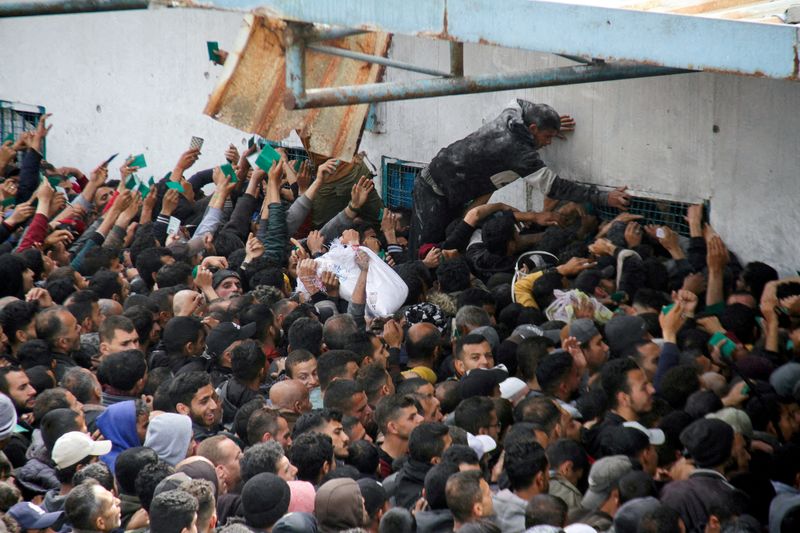By Humeyra Pamuk
WASHINGTON (Reuters) -Israel has taken significant steps in recent weeks on allowing aid into Gaza, the U.S. special envoy for humanitarian issues said on Tuesday, but considerable work remained to be done as the risk of famine in the enclave is very high.
David Satterfield declined to say whether Washington was satisfied by Israel's moves, weeks after U.S. President Joe Biden demanded action to alleviate the humanitarian crisis in Gaza, saying conditions could be placed on U.S. support for close ally Israel if it did not implement a series of "specific, concrete and measurable" steps.
"Israel has taken significant steps in these last two and a half weeks," Satterfield told reporters. "There is still considerable work to be done. But progress has been made."
The risk of famine throughout war-devastated Gaza, especially in the north, is "very high", he said, calling for more to be done to get aid to those in need in that part of the tiny, densely populated Palestinian territory.
The United Nations has long complained of obstacles to getting aid in and distributing it throughout Gaza in the six months since Israel began an aerial and ground offensive against Gaza's ruling Islamist militant group Hamas.
Israel's military campaign has reduced much of the territory of 2.3 million people to a wasteland with an unfolding humanitarian disaster since October, when Hamas ignited war by storming into southern Israel.
The head of the U.N. Palestinian refugee agency (UNRWA), Philippe Lazzarini, said on Tuesday that the daily average number of trucks entering Gaza during April was 200 and that there had been a peak on Monday of 316.
"We have always stressed that we were in a man-made situation and it can only be addressed by political will and decisions, and the last few days show this is possible," he told reporters. "The more we sustain this, the more we will have a positive impact."
There was also now a focus on garbage collection, he added, especially in southern Gaza, in a bid to avoid disease outbreaks as the warmer weather approaches.
UNRWA has been described by top U.N. officials as the backbone of aid operations in Gaza. But earlier this year, Israel accused 12 UNRWA staff of taking part in the Hamas-led Oct. 7 attacks that triggered the Gaza war. Israel's allegations led 16 countries to pause or suspend funding of $450 million to UNRWA.
Lazzarini said UNRWA currently has enough funding to pay for operations until June. However, funding by the U.S. - UNRWA's biggest donor at $300 million to $400 million a year - has been suspended by the U.S. Congress until at least March 2025.

"If it is a lasting suspension it will have sustainable impact on the agency. If it is a temporary suspension, I do believe we can find a temporary solution with some donors stepping in," Lazzarini said.
He also said there has been an "extraordinary kind of grassroots solidarity" with UNRWA, which had raised $100 million from online public donations in the past six months.